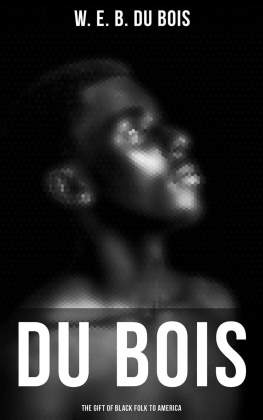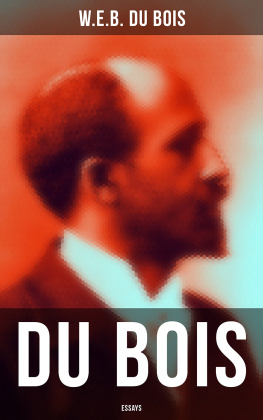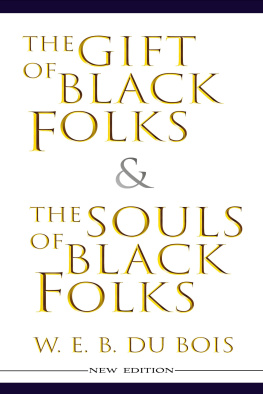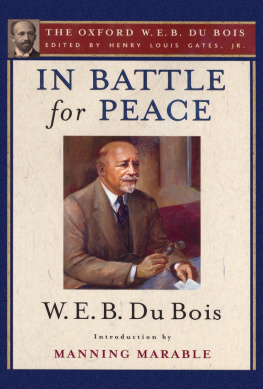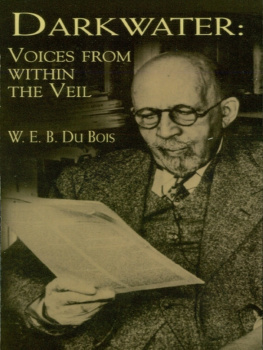W. E. B. Du Bois and the Critique of the Competitive Society
W. E. B. Du Bois and the Critique of the Competitive Society
ANDREW J. DOUGLAS
The University of Georgia Press Athens
2019 by the University of Georgia Press
Athens, Georgia 30602
www.ugapress.org
All rights reserved
Set in Kepler by Melissa Buchanan
Most University of Georgia Press titles are available from popular e-book vendors.
Printed digitally
Library of Congress Cataloging-in-Publication Data
Names: Douglas, Andrew J., 1980 author.
Title: W.E.B. Du Bois and the critique of the competitive society / Andrew J. Douglas.
Description: Athens : The University of Georgia Press, 2019. | Includes bibliographical references and index.
Identifiers: LCCN 2018049577| ISBN 9780820355092 (hardcover : alk. paper) |
ISBN 9780820355108 (ebook)
Subjects: LCSH: Du Bois, W. E. B. (William Edward Burghardt), 18681963Political and social views. | CapitalismSocial aspectsUnited States. | CapitalismMoral and ethical aspectsUnited States. | CompetitionSocial aspectsUnited States. | CompetitionMoral and ethical aspectsUnited States. | African AmericansEducation (Higher) | African AmericansEconomic conditions. | RacismEconomic aspectsUnited States. | United StatesRace relationsEconomic aspects.
Classification: LCC E185.97.D73 D68 2019 | DDC 323.092 [B] dc23
LC record available at https://lccn.loc.gov/2018049577
CONTENTS
ACKNOWLEDGMENTS
When I began teaching at Morehouse College in 2011, I had only a vague sense that W. E. B. Du Bois had published some of his most significant texts while working from an office just a short cross-campus walk from my own. Perhaps it is fitting that by the end of my first year in Atlanta, some of those very textsThe Souls of Black Folk, Black Reconstruction in America, Dusk of Dawn, books written during Du Boiss tenure at the former Atlanta Universitywould become centerpieces of my political theory course offerings. I had always thought of Du Bois as an incisive political theorist, a foremost critic of Western liberalism. But in those first few years at Morehouse, as a result of rich and often deeply moving discussions with students, I was made to see that there was more to the story and that more had to be said. It was primarily my students who led me to see that the lens of competition, the conceptual framework that I have come to refer to as the competitive society, could provide a new and generative way of getting at the distinctiveness and enduring salience of Du Boiss critique. Without a doubt, the reading of Du Bois put forth in this book bears the collaborative imprint of dozens of former and current Morehouse undergraduates, some of the best interlocutors I have known. I highlight in particular Jared Loggins, Marcus Lee, Da Von Boyd, and Ryan Russell, now budding academics whom I have always thought of as colleagues.
For too long the broader U.S. academy has been a rather uncritical echo chamber of the competitive society, predisposed in various ways to the perpetuation of competitive animosities, if not the reproduction of a world torn between winners and losers. There have been and continue to be exceptional institutions and people, of course. Du Bois argued that historically Black colleges and universities, what we refer to today as the HBCUs, have always represented at least the possibility of another way. I can see what he was getting at. Every day I absorb the generosity and cooperative spirit, not to mention the vast wealth of expert knowledge, of so many of my faculty colleagues at both Morehouse and Spelman College. I am especially , likely would not have been written. Beyond my HBCU communities, some exceptional colleagues have lent this project insight and encouragement. I highlight in particular Lawrie Balfour, Melvin Rogers, Neil Roberts, Chip Turner, Joy James, Desmond Jagmohan, Lida Maxwell, Robyn Spencer, Saladin Ambar, Greta Snyder, and Justin Rose, to whom I dedicate the concluding chapter. In 20162017, I was the fortunate recipient of a sabbatical-year fellowship at the Whitney Humanities Center at Yale University, and for their support I thank Gary Tomlinson, Mark Bauer, Jacqueline Goldsby, Paul North, and the Andrew W. Mellon Foundation.
It has been an honor and pleasure to work with the University of Georgia Press, my hometown publisher. I am grateful to Walter Biggins, who showed early and consistent enthusiasm for the project, and to Beth Snead, Jon Davies, David Des Jardines, and Elaine Durham Otto, each of whom provided skillful guidance throughout the production process. Various pieces of the books argument, spread out over several chapters, were published in an earlier article, W. E. B. Du Bois and the Critique of the Competitive Society, Du Bois Review 12, no. 1 (Spring 2015): 2540. I thank Cambridge University Press for permission to reprint this material. My thinking has benefited greatly from the suggestions of several anonymous readers, at both the Du Bois Review and the University of Georgia Press.
In the end, my most heartfelt thanks go to Marcie Dickson and our daughters, Juliana and Genevieve, the three of whom have contributed to this project in immeasurable ways and have made the sleepless nights all worthwhile. To them, I dedicate this book.
W. E. B. Du Bois and the Critique of the Competitive Society
CHAPTER 1
A More Perfect Union
Competition, therefore, is a law of nature. Nature is entirely neutral; she submits to him who most energetically and resolutely assails her. She grants her rewards to the fittest, therefore, without regard to other considerations of any kind. If, then, there be liberty, men get from her just in proportion to their works, and their having and enjoying are just in proportion to their being and doing. Such is the system of nature.
WILLIAM GRAHAM SUMNER, THE CHALLENGE OF FACTS (1914)
But, bless your soul, man, we cant all always attain the heights, much less live in their rarified atmosphere. Aim at emthats the point.
W. E. B. DU BOIS, IN DUSK OF DAWN (1940), PARAPHRASING THE WORDS OF A FICTIVE WHITE FRIEND
Competition would seem to be an inexorable feature of the human situation. We rival, we jockey for position, we claw and scratch in efforts to get the better of one another. This is a simple but sobering observation, to be sure, and it is one that has long been a cornerstone of the liberal tradition, indeed a key part of that traditions celebrated genius. In the words of W. E. B. Du Boiss fictive White friend, We cant all always attain the heights. There will be winners and losers. But a good society, or at least a reasonably decent one, gives us a fighting chance, and, well, thats the point.
Of course, these epigraphic words of Du Boiss are meant to convey a degree of sarcasm. Certainly Du Bois was drawn to the liberal paradigm. His legacy could well be defined by a spirited effort to pry open the gates of opportunity, to expand the protection of individual rights and liberties, to give the abused at least something of a fighting chance. But Du Bois grew increasingly disillusioned with a political and economic philosophy that sought to facilitate competition among private parties. The worry was that competition would always guarantee loss and defeat for some, and if divisions between the successful and the rest could be cast as perfectly natural, perfectly consistent with a liberated humanity, then a freely competitive society would seem poised to remain a rather damning place for people of color and others historically subjected to the weight of competitive disadvantage.
This was a prescient concern. A half century after Du Boiss death, a more fully liberated America has become a more fiercely competitive place, a society somehow more freely torn between winners and losers. And as the worry would have it, women and men of color continue to bear the brunt of this apparently inexorable way of the world. In the absence today of any real public scrutiny of the competitive way of life, it will be worthwhile to revisit the provocations of a Du Bois engaged in old-fashioned ideology critique. The idea, we are told, is to relish in our freedom to compete, to duke it out for that rarefied atmosphere. But, bless our souls, we cant all always attain the heights. As Du Boiss later work indicates,
Next page

